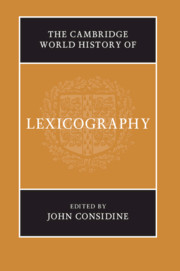Book contents
- The Cambridge World History of Lexicography
- The Cambridge World History of Lexicography
- Copyright page
- Contents
- Contributors
- Editor’s Acknowledgements
- Introduction
- Part I The Ancient World
- Part II The Pre-Modern World
- 6 China, c. 600–c. 1700
- 7 India and Tibet, c. 500–c. 1750
- 8 Arabic to c. 1800
- 9 Hebrew to c. 1650
- 10 The Chinese Periphery to c. 1800
- 11 The Turkic Languages and Persian to c. 1700
- 12 Byzantine Greek
- 13 Medieval Latin Christendom
- 14 Early Modern Western and Central Europe
- Part III The Modern World: Continuing Traditions
- Part IV The Modern World: Missionary and Subsequent Traditions
- Appendix 1 The Language Varieties
- Appendix 2 The Lexicographers
- Primary Sources
- Secondary Sources
- Index
12 - Byzantine Greek
from Part II - The Pre-Modern World
Published online by Cambridge University Press: 01 September 2019
- The Cambridge World History of Lexicography
- The Cambridge World History of Lexicography
- Copyright page
- Contents
- Contributors
- Editor’s Acknowledgements
- Introduction
- Part I The Ancient World
- Part II The Pre-Modern World
- 6 China, c. 600–c. 1700
- 7 India and Tibet, c. 500–c. 1750
- 8 Arabic to c. 1800
- 9 Hebrew to c. 1650
- 10 The Chinese Periphery to c. 1800
- 11 The Turkic Languages and Persian to c. 1700
- 12 Byzantine Greek
- 13 Medieval Latin Christendom
- 14 Early Modern Western and Central Europe
- Part III The Modern World: Continuing Traditions
- Part IV The Modern World: Missionary and Subsequent Traditions
- Appendix 1 The Language Varieties
- Appendix 2 The Lexicographers
- Primary Sources
- Secondary Sources
- Index
Summary
The Byzantine millennium is customarily defined as beginning with the closure of the Neo-Platonic school in Athens ordered by Emperor Justinian in the year 529, and ending with the capture of Constantinople in 1453 by the Ottoman army led by Sultan Mehmed II. Of course, Greek lexicography existed before Byzantium (see Chapter 5). Furthermore, the Byzantine legacy extends into the European Renaissance, affecting both the Greek-speaking communities and European scholars who learned Greek. The present chapter covers those regions of the Byzantine empire where Greek was spoken, that is to say grosso modo Greece, Asia Minor, and southern Italy. Constantinople and its institutions formed one of the main centres for the preservation and evolution of Byzantine Greek lexicography throughout this time. Some other cities and regions – such as Thessalonica and the ‘Terra d’Otranto’ in southern Italy – also played an important role in the production and dissemination of certain lexicographic works. The texts which will be discussed in this chapter are preserved in parchment or paper manuscripts, usually in codex form, dating from around the ninth century up to the sixteenth.
- Type
- Chapter
- Information
- The Cambridge World History of Lexicography , pp. 247 - 266Publisher: Cambridge University PressPrint publication year: 2019
- 1
- Cited by



